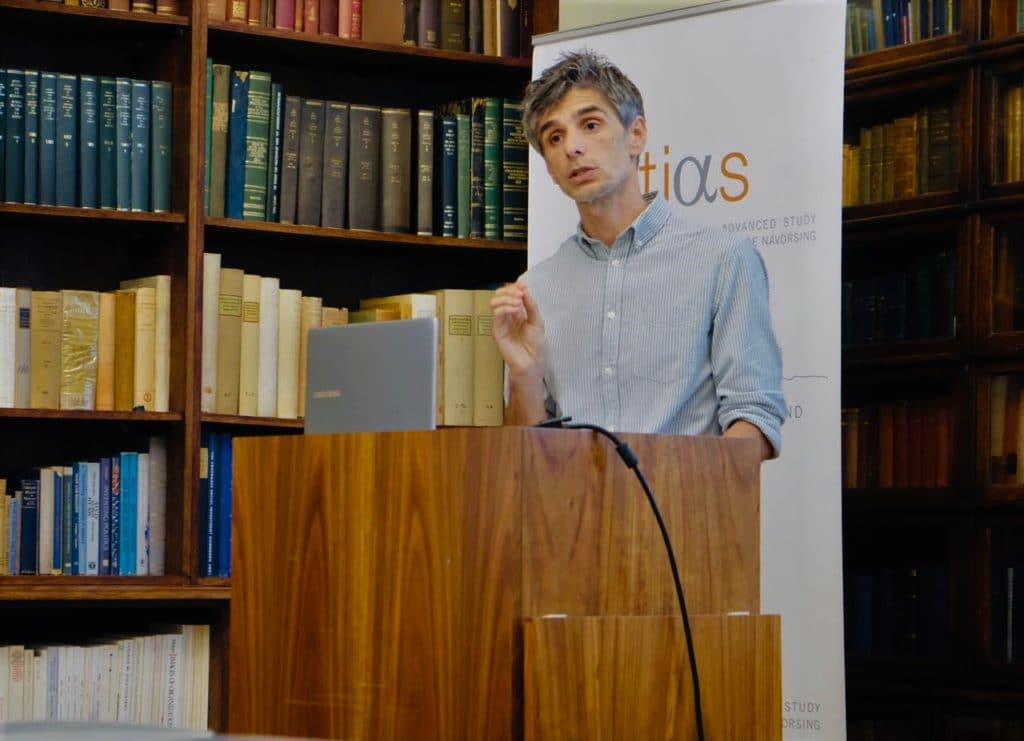“The book examines the contemporary relationship between religion and politics through the work of Jacques Derrida in order to interrogate some insufficiently analysed foundations of modern secular discourse,” said STIAS fellow Andrea Cassatella of the Columbia Global Centers, Amman.
Cassatella was giving an overview of his current book project, Beyond the Secular: Jacques Derrida and the Theologico-Political Complex.

“It’s organised in two main parts,” he explained. “The first, more philosophical part, sets the critical framework for re-thinking the theologico-political relationship through a focus on conceptions of language and time-informing dominant forms of modern political thinking. The second covers more recognisably political topics and considers questions of globalisation, political authority and community, as well as the relationship between Islam and the modern discourse of religion. Exploring especially globalisation as translation and the future of democracy.”
“Overall, I’m trying to understand how the secular world order relates to global processes and human development.”
He described the importance of language and specifically of the challenges of transferring universal meanings using translation.
“Language shapes knowledge – and allows specific ways of thinking,” he said. “If we see knowledge as secular it gives a particular understanding of morality and subjectivity.”
“Language is irreducibly political,” he continued. “The rules and conventions of language are not severed from political influence.”
“Language is a system of signs which change over time and context and don’t maintain the same meaning. The relationship between word and meaning is never objective and is mediated by cultural-specific forces. Concepts are about both what is named and what is excluded. You cannot calculate all possible meanings of a word and you cannot calculate the future from the present meaning of a word.”
“There are complex realities when we move away from a Western Christian perspective that informs the secular world order,” said Cassatella.
“Translation is fundamental to how the relationship between religion and politics is negotiated. There is more than linguistic meaning when you translate from one language to another. There is some sense of the untranslatable at the core of language.”
The future of democracy
Turning to a broad discussion of democracy, Cassatella asked: “If democracy is desirable, is democracy inclusive of religious freedom or should the future be secular to be democratic at all?”
“We know that even if the future of democracy is liberal and secular, you can still have mass inequality and racism.”
He pointed to high levels of plasticity in the ideas of democracy and very different forms of democracy over time and geographical place.
“Democracy is generally seen as being about freedom and equality but with an emphasis on which of these? Freedom of the collective can be used to suspend individual liberties. In the post-911 world there is a lot of suspicion about the democratic nature of political liberalism globally. Current events linked to the COVID-19 pandemic are likely to have a similar effect.”
Thinking about where we want to be
Using the metaphor of autoimmunity he pointed to the need to think differently about democratic sovereignty, and more generally about the identity of democracy. “If seen as an autoimmune organism that suspends its self-defense, or immunity, in order to protect itself over time, democracy is subject to modifications and discontinuity. We should see democracy as a living organism.”
“It’s time for radical self-criticism and to renegotiate the terms by which we live,” he continued. “We must be allowed to question democracy and even think of the democratic beyond the secular. We can change the horizon of what democracy can be. Open space for the imagination – space for a potentially different grammar to emerge.”
Michelle Galloway: Part-time media officer at STIAS
Photograph: Noloyiso Mtembu
